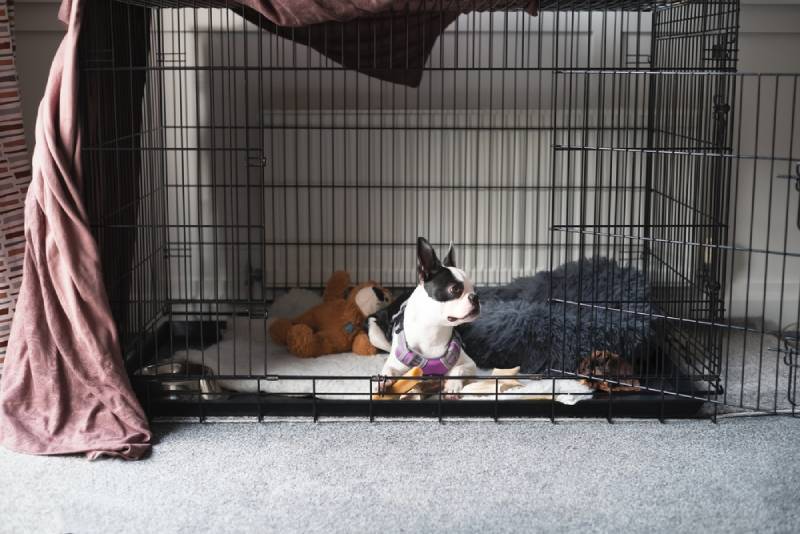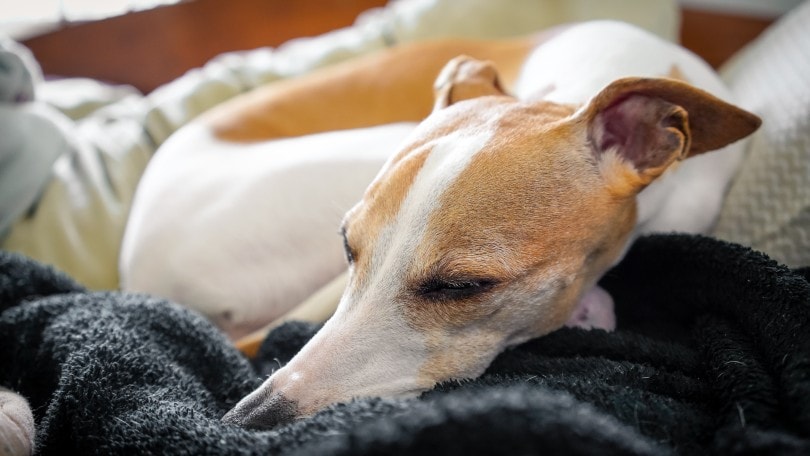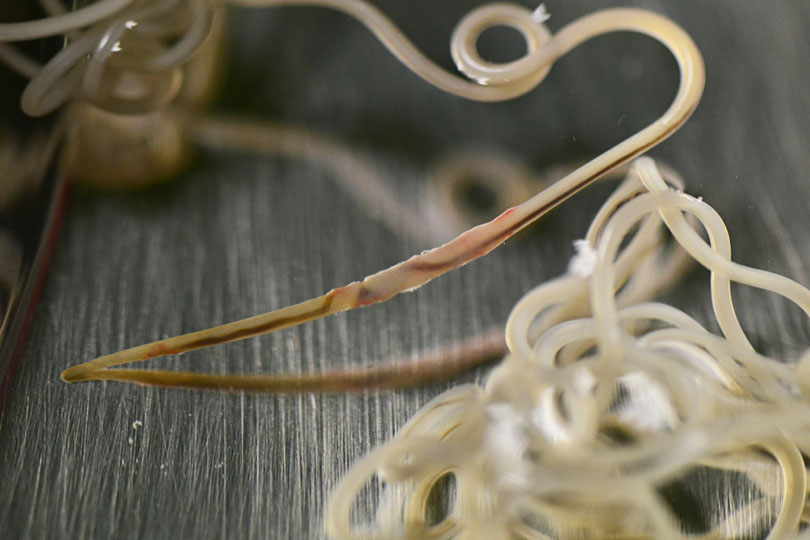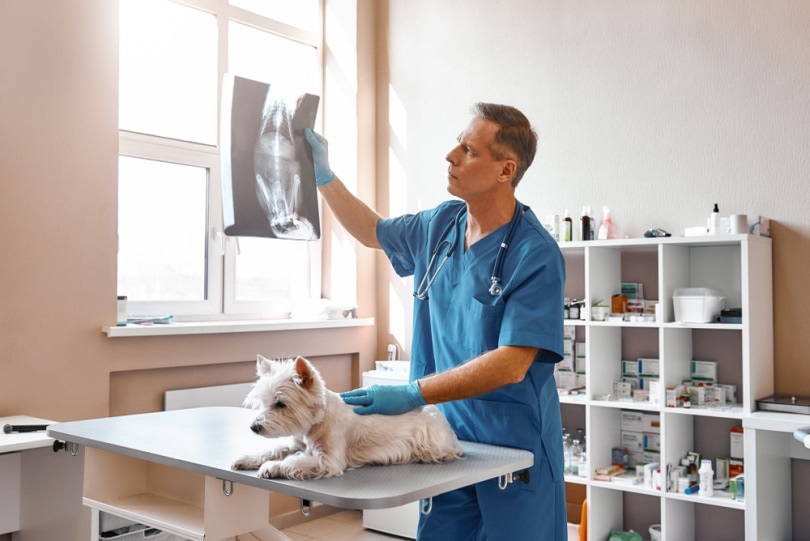How Do I Keep My Hyper Dog Calm After Heartworm Treatment: 8 Effective Ways

Updated on

Treating heartworms is a serious matter. In order to avoid severe complications from raised heart rate or blood pressure, a dog undergoing treatment must be kept calm. If your pet is a hyper dog, this is especially difficult to accomplish.
The best way to keep your dog calm after heartworm treatment is to keep their environment quiet and occupy their mind. If you live in a high-energy setting, such as one with active children or frequent visitors, find ways to restrict these noises and interruptions. Limiting the number of distractions and novelties in your home will go a long way toward preventing your dog from getting overexcited.
Instead, keep your dog’s mind occupied with appropriate toys and games. Although the prospect of managing your hyper dog’s moods may be daunting, as long as you take the appropriate steps, there are some things you can do to calm your anxious canine.
The 8 Ways to Keep a Hyper Dog Calm After Heartworm Treatment
1. Place Your Dog on Cage Rest
Cage rest is the canine equivalent of bed rest for humans; you put your dog in a cage and keep them from moving around—except for taking them out several times a day for toilet breaks. When preparing the cage for your dog, ensure that it has enough space for the dog to move around comfortably and that you put in something soft for the dog to sleep on.
If your dog is not used to being caged, then cage rest can cause anxiety and raise your dog’s heart rate, which is what you want to avoid.

2. Restrict Exercise
Exercise restriction means that your dog should be kept indoors most of the time. When you do take them outdoors, then keep them on a leash so as to restrict your dog’s ability to follow their urges to run off and have fun. During your dog’s time outside, try and keep them away from anything that might excite them, such as other dogs, squirrels, birds, or other animals they like to chase, neighbors, or other people that might interact with your dog.
Obviously, you shouldn’t play any energetic games with your dog, such as running or fetching balls or sticks.
3. Keep Your Home Quiet
You should limit the number of visitors to your home while your dog is receiving treatment, especially if your dog gets excited when guests arrive. You should avoid any interaction with other dogs, whether they are visitors or on playdates. Too much activity can stress your dog out and make their condition worse. If you have other pets, try to keep them away from your dog as much as possible.
Dogs with heartworm often need peace and quiet to recover. Avoid loud noises in the house, such as vacuuming or playing music loudly. These can agitate your dog and make their condition worse.

4. Keep Your Dog’s Mind Busy
If your dog can’t expend their energy physically, then you need to help them utilize it mentally. Dogs like rewards and will spend time working out how to get treats. There are toys and puzzle games that dogs have to spend time working out before arriving at a treat.
Another way to keep your dog occupied is a snuffle mat in which you hide treats. Keep an eye on your dog to make sure they aren’t becoming too agitated.
5. Replace Activity With Affection
Keeping your dog calm doesn’t mean leaving it alone. Interacting with the dog regularly keeps him from feeling lonely and anxious. To compensate for the dog’s lack of activity, show extra affection, petting, and cuddling, anything that can be done calmly. This is a wonderful time to show your pup just how much they mean to you. This can be a difficult and boring time for both you and your dog, but by showing them lots of love and care, you can help them through it.

6. Consider Long Slow Walks
You should consult with your vet and discuss how the vet wants to limit your dog’s activity. Although dogs undergoing heartworm treatment are normally restricted to a few short walks a day for toilet breaks, your vet might allow long walks as long as you walk them slowly keeping the dog’s heart rate down. If your vet will allow it, this is a great way to use up time.
Keep the walk at a slow pace. This will help your dog stay calm and avoid getting too excited. You should also avoid walking in areas with high grass or thick underbrush. These can be difficult for your dog to navigate and can cause them to over-exert themselves. Finally, be sure to bring plenty of water for both you and your dog. It is important to keep your dog hydrated during treatment.
7. Leashing Your Dog Inside the House
Despite your best efforts to provide your dog with a calm environment and plenty of mental distractions, there are some dogs that will still want to be active. In this case, you should talk to your vet and see what they recommend. Your vet might recommend leashing your dog inside the house. This is slightly less restrictive than caging your dog and does allow you to take your dog throughout the house as you go about your daily life. Your dog won’t understand why all of a sudden their life has changed and why they are now being restricted.

8. Medicating Your Dog
As a last resort, your vet might consider medication to relax your dog and put it into a less active state. For some dogs, medication during heartworm treatment is key to a successful and stress-free experience for both you and your pet. There are a variety of medications available that can help to ease your dog’s anxiety and keep them calm during the treatment process.
Talk to your veterinarian about which medication may be right for your dog and be sure to follow their instructions carefully. With the help of medication, you can rest assured that your dog will remain calm and comfortable throughout their heartworm treatment.
What Is Heartworm?
Heartworm is a parasitic worm that enters a dog’s bloodstream as larvae through the bite of a mosquito. Once in a dog’s bloodstream, the worms travel to the heart and lungs, and pulmonary arteries, where they then grow into adult heartworms, mate, and produce more worms. The adult worms can grow up to 12 inches long and live for 5–7 years. Female worms produce millions of microfilariae (baby worms) that circulate in the bloodstream.
How Heartworm Affects Your Dog
After larvae enter a dog’s bloodstream, it takes the larvae about six months to develop into adult worms. Once infected, the worms will grow in number until your dog is infected with hundreds of worms. The heartworms feed off the dog’s blood, stealing nutrients from your dog.
In the first six months, your dog may have no symptoms. Many dogs with adult heartworms show only mild symptoms. Symptoms start presenting through mild coughs, which can develop into persistent coughs and difficulty breathing, especially during exercise. Without treatment symptoms, in the final stages may include “severe weight loss, fainting, coughing up blood, and finally, congestive heart failure”.

Heartworm Treatment
Heartworm has to be treated in two phases. First, the adult heartworms have to be killed, and then the larvae have to be taken care of. In the U.S., the FDA has approved a class of drugs available under the trade names Immiticide and Diroban for killing adult heartworms. The medicine is normally administered through an injection in the dog’s back.
After the adult worms die, their bodies have to be broken down and removed by the dog’s system. Bits of the adult worms’ bodies may be in the dog’s bloodstream, and exertion may cause them to move into the lungs causing respiratory damage or even death. It is at this point that the dog is most at risk and must avoid exertion for at least several weeks or as long as your vet directs.
Once the adult worms are dead, the medication to kill the larvae can start, which may be administered through a topical or oral treatment.
Prevention Is the Best Cure
Heartworm treatment is expensive, unpleasant, inconvenient, and potentially dangerous. A simpler solution is to prevent your dog from becoming infected in the first place. Preventative medications that are harmless can be administered on a regular basis to your dog to kill any larvae that have got into its system. As there are many options available, some of which can treat or prevent other parasites, you should discuss your dog with your vet for a recommended treatment.
If your dog is not receiving regular preventative treatment for heartworm, then consider testing your dog annually for heartworm. An early diagnosis will reduce the amount of damage that the heartworms can do to your dog.
Final Thoughts
Heartworm treatment can be a trying time for both you and your dog. By following the above tips, you can help make the process a little easier on both of you. Remember to stay calm yourself, and give your dog plenty of love and attention. With a little patience, you’ll get through this treatment together.
Featured Image Credit: Mylene2401, Pixabay













